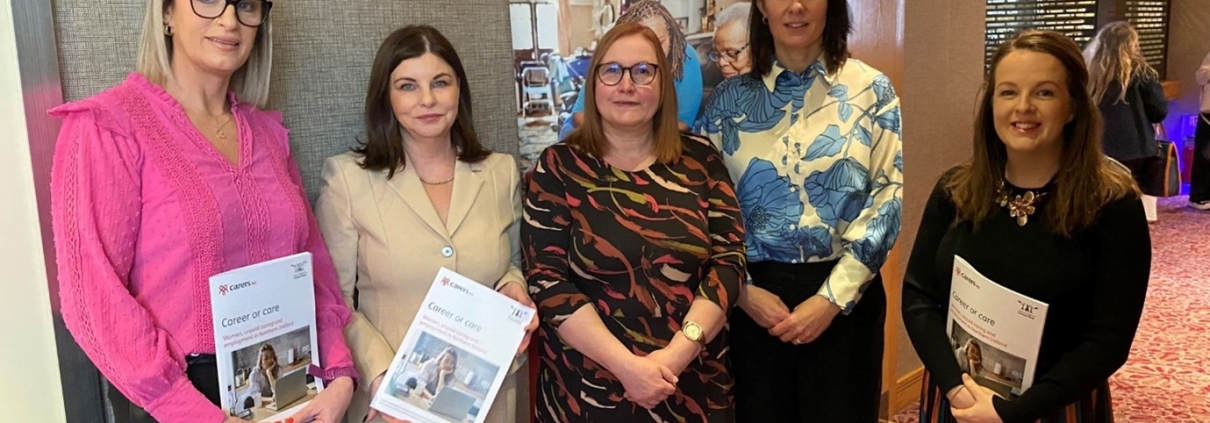The latest Consortium research paper on Women, Unpaid Care & Employment has now been published in collaboration with Carers NI. The final report includes a wealth of feedback from women who took part in focus group sessions over the last few months as well as the results of survey data from Carers NI through their State of Caring report.
The key findings of the research are:
- Nearly 60% of unpaid carers are women
- Women have a 70% chance of providing care in their adult life compared to 60% for men and are more likely to care early in their life. By the time they are 46, half of all women have been a carer (11 years before men)
- More than one in six women in employment are providing unpaid care (approximately 71,000 women)
- Women are more likely to leave the labour market due to caring responsibilities
- One in three women have given up work to care (34%)
- One in four women have decreased their working hours due to a caring role (28%)
- One in six women have taken on a less qualified job or turned down a promotion to fit around caring responsibilities (17%)
- Nearly three quarters (73%) have lost out on between £500 and over £1500 per month in wages because of challenges juggling work and care
- Women “juggle” their caring role and employment often at the detriment of their own career, finances and health and wellbeing
- The financial impact of stopping/reducing work to provide care is felt by women not only while providing the care but throughout their lives
- Carer’s Allowance in terms of its value and low earnings threshold is inadequate to support women to balance care and work
- Support for carers in work is often a lottery, dependent on individual employers and line managers
- Inadequacies in wider support services, including social services, healthcare, education and childcare are stopping women from working altogether or limiting the amount of work they can do
- For some women work can be positive in terms of mental health and wellbeing and gives them a break from their caring role
- Women feel reliable, accessible support services, a range of flexible working options, carer’s leave and a change to the eligibility criteria for Carer’s Allowance would help balance work and care
- A lack of support for carers in the workplace results in a loss of valuable and skilled individuals to the labour market
The report made the following recommendations for employers:
- Raise awareness of unpaid caring within the workplace, including sources of advice, information and support for carers
- Identify and support staff with caring roles – including through line manager training on recognition and support of unpaid carers and young carers entering the labour market for the first time
- Engage with carers and carer organisations to introduce carer friendly policies and supportive workplace cultures for carers including flexible working options as a day 1 right and paid carers leave that is separate to holiday entitlement
- Adopt Carers UK’s Carer Confident benchmark, run by Employers for Carers, to move towards becoming a carer friendly employer
- Develop work placements and training schemes to support young adult carers to enter the labour market and those carers returning to work
The report made the following recommendations for Government:
- Work with relevant bodies to raise awareness of carers’ existing rights within the workplace, as well as the benefits of flexibility for unpaid carers
- Enshrine carers rights in legislation to ensure consistency across employers
- Legislate for paid carer’s leave from work that is separate to annual leave and a day one right to request flexible working for all unpaid carers
- Raise the Carer’s Allowance earnings threshold to the equivalent of 21 hours per week at the National Living Wage. Introduce an interim Carer’s Allowance Supplement scheme with a view to then increasing the level of Carer’s Allowance to £120 per week
- Cut waiting times for welfare support for carers who may move in and out of work frequently
- Review how women who reduce or stop employment to care can be supported to maintain their state pension contribution
- Improve support for carers to access further and higher education through financial support, such as bursaries and increased availability of part time and online courses
- Reform the social care system to provide reliable, consistent, high quality replacement and support care, including domiciliary care, respite, day services and services for young adults with special needs to support the transition from children’s services
- Deliver a fit for purpose and affordable childcare system across the whole of Northern Ireland including appropriate childcare for children with special needs (both during term time and in school holidays)
- Develop tailored employability programmes to support and retrain carers who wish to return to employment after a caring role has ended or reduced
- Provide accessible, timely mental health support for working carers
The report made the following recommendations for wider society:
- Recognise and value the immense contribution unpaid carers make to society
- Adopt a universal caregiver approach where unpaid caring no longer has such a gendered dimension.
There was considerable media coverage of the research which included the voices of a number of women unpaid carers. You can read and listen again to the coverage on the research below:
Newsletter:
BBC News:
https://www.bbc.co.uk/news/uk-northern-ireland-68407592
On Your Behalf, BBC Radio:
https://www.bbc.co.uk/sounds/play/m001wx7w (listen again from 15:50 minutes)
Irish News:
Belfast Live:
https://www.belfastlive.co.uk/news/northern-ireland/larne-woman-gives-up-35-28685744.amp
BBC Newsline (TV):
https://twitter.com/CarersNI/status/1762501113616490898
BBC Good Morning Ulster (Radio):
https://twitter.com/CarersNI/status/1762509843707937220
Read the full research paper or a shorter 4-page summary of the research.



